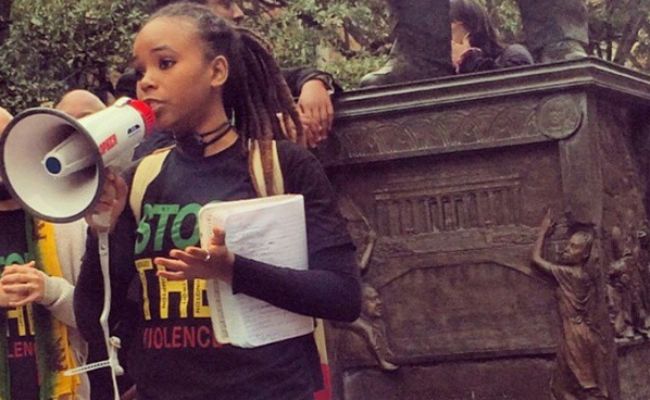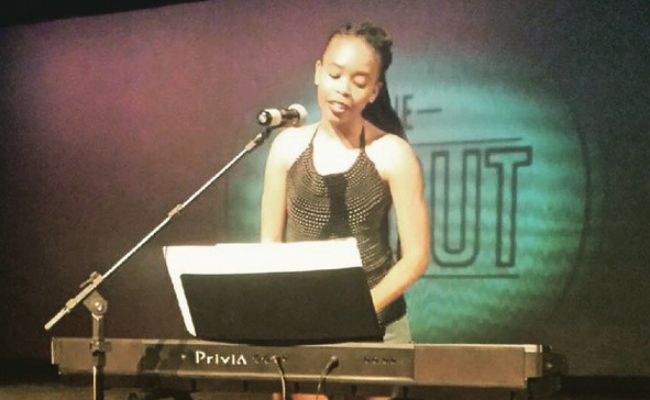
Introduce yourself.
My name is X’ene Sky and I currently live in Houston, Texas although I’ll be relocating to Austin in May for Graduate School at UT Austin. I am a classically trained pianist, singer, composer as well as an organizer and activist. I enjoy working with children, reading, painting and yoga.
How long have you been wearing your hair in its natural state?
I have been wearing my hair natural my entire life (so 22 years”>. My mother and father both have dreads, and as a child my hair was not tampered with, but allowed to grow in its natural state.
Everything I do is radical, from the way I wear my hair, to the way I dress.
How do you self-identify?
I identify as a black American. I believe I am one facet of a diaspora of women and men that are not monolithic, but rather come in every shade, hue and size imaginable. I believe my style is one of liberation. Everything I do is radical, from the way I wear my hair, to the way I dress. I believe that my hair is a direct protest of the singular, damaging and Eurocentric beauty standards as well as the respectability politics that black women are so often asked to uphold.
What (or who”> influenced you?
I am directly influenced by my mother. She has dreads down below her back, and has always been a direct model for a woman who lives fiercely and unapologetically. When I was teased by girls in high school who told me i’d be so “pretty” with “normal” hair, it was she who inspired me to love my unique beauty. I am also deeply influenced by David Hines of the reggae band Steel Pulse, Bob Marley and his son Damian Marley. Their commitment and understanding of dreadlocks as a lifestyle and not a trend inspires me daily.
Dreads are not worn to be cute or on trend, but are apart of a lifestyle dedicated to revolution and liberation.
What is the one thing people who live their lives differently than you could understand about your lifestyle?
I think the one thing I would like to impart is that dreads are indeed a lifestyle. For many people who wear dreads, it is a direct and outward defiance of the status quo. Dreads are not worn to be cute or on trend, but are apart of a lifestyle dedicated to revolution and liberation. When asked how important are his dreadlocks in an interview, Bob Marley said “This is my identity man.” An identity that for me and so many other people involves vegetarianism, spiritual exploration, meditation and a commitment to truth.
Is the term “dreadlocks” offensive to you?
The term dreadlocks is not offensive to me, because for me it holds no negative connotations. I was blessed to have been raised in a way where I was taught rasta ideals, but also allowed to dye and experiment with my hair and image. However, I do think it is important to distinguish from dreadlocks, which require a journey filled with time and growth, as opposed to a faux style which is usually done for aesthetics.
What are your thoughts on someone with faux locs as a temporary style (i.e. Zendaya”> representing your community?
I believe Zendaya is beautiful, and that her statements on dreadlocks were filled with good intention. I do believe however, that as a woman with freeform dreads (meaning I have never twisted or undergone any process to form my hair”> that she does not speak for me or the community I belong to. Zendaya’s hair represents a style, and while her comments where thoughtful, they did not speak to the lifestyle behind the hair. Because wearing dreadlocks with the option to take them out is one experience, but navigating through years of a journey that extends far beyond hair is another. I have love for everyone who chooses to wear a dread inspired look, and I often find them beautiful and daring. I believe that it is important though to distinguish from a hairstyle as opposed to a lifestyle.
More: Zendaya Fires Back At Giuliana Rancic For Insulting Her Faux Locs
What I would like to see in this movement is more of an embrace of women with dreads or fades or afros, hair that is not as “manageable” but is just as natural. Because not all black women have perfectly bouncy curls when they go natural, and perpetuating that image is dangerous.
What are your thoughts on the current new wave of the Natural Hair Movement?
The current new wave of the natural hair movement is interesting to me. I remember vividly being teased for my hair in high school only to be met by those same girls years later who had now gone natural. I think that going natural is a beautiful and brave process that I commend anyone for undertaking. Unfortunately, I think this new natural hair movement is far too focused on a monolithic view of what it means to be natural. Far too often, natural is synonymous for curly, mixed hair. This is not only damaging, but unrealistic.
Unfortunately, I think this new natural hair movement is far too focused on a monolithic view of what it means to be natural
What I would like to see in this movement is more of an embrace of women with dreads or fades or afros, hair that is not as “manageable” but is just as natural. Because not all black women have perfectly bouncy curls when they go natural, and perpetuating that image is dangerous.





